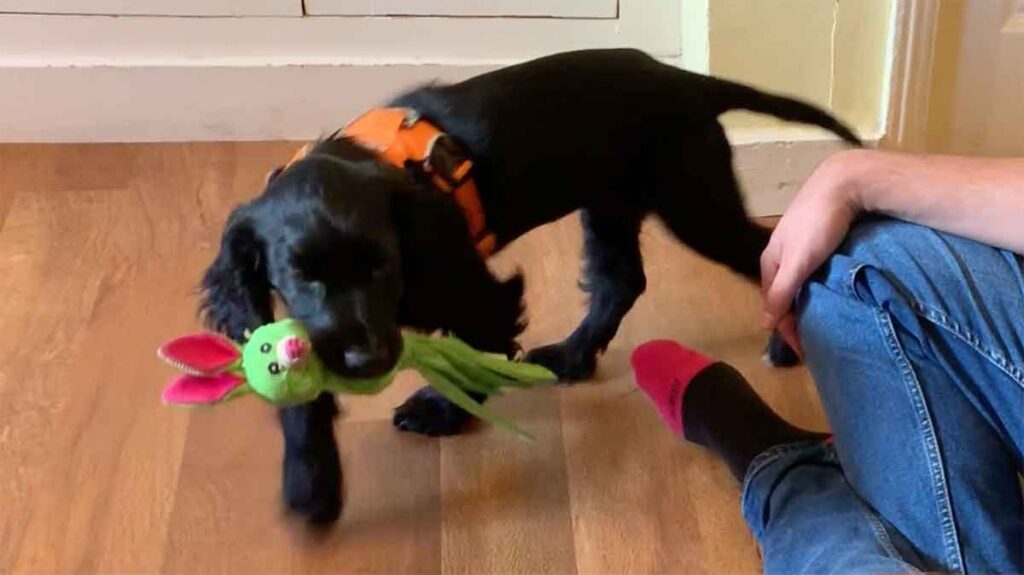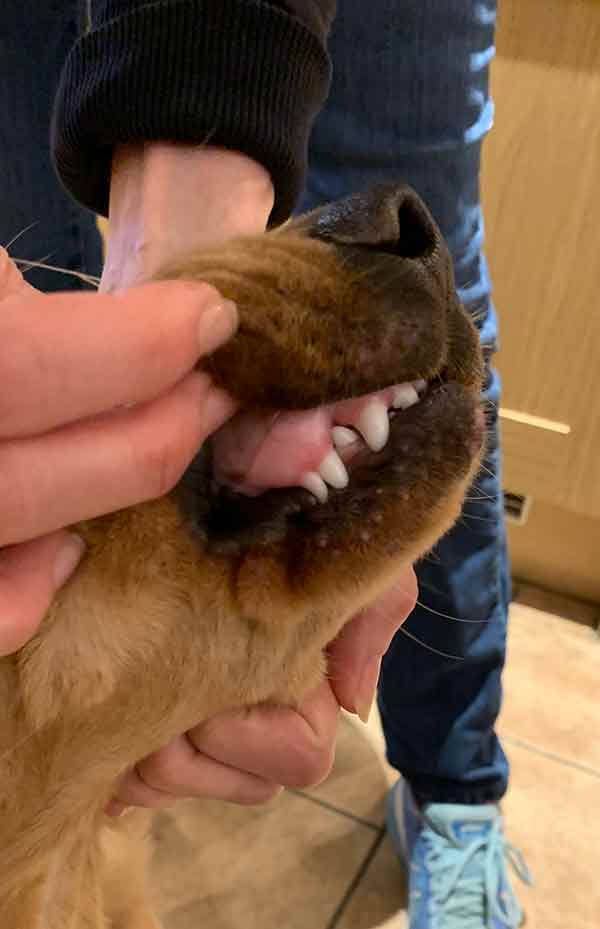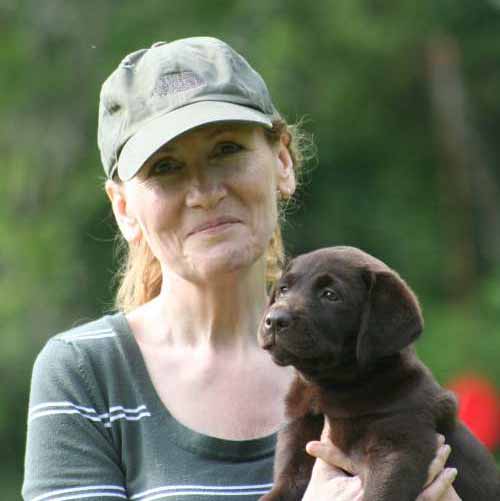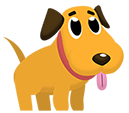Like human babies, a puppy’s first teeth are temporary milk teeth. Puppies are born with no visible teeth, and these milk teeth appear over the first few weeks of life.

At a few months old your puppy’s first teeth will fall out and new permanent teeth will emerge. Unlike human babies, the whole process from no teeth to adult teeth, is done and dusted within seven months.
While puppy teething is a fairly quick and efficient process, it’s not without its potential hurdles.
There are a lot of problems that are put down to teething, including destructive chewing, and excessive biting. And while there’s no doubt that the emergence of new teeth can contribute to these problems, it isn’t the whole story.
So we’ll have a quick look at the teething process, and at the issues that are often considered to be part and parcel of it.
Baby Teeth Arrive
Puppies have just 28 milk teeth, which start to emerge through their gums long before they step into your life. Incisors come first, followed soon after by canines and premolars.
The first teeth arrive before your puppy is four weeks old, with the last coming through by six weeks. So by the time your bring your puppy home, they have a complete set.
Puppy baby teeth are very sharp. Small puppies do not have any molars, those blunt back teeth that are used for crushing large bones, but raw fed puppies are still able to crush small bones. And it hurts when puppies bite!
Losing Baby Teeth
At about three months old, the roots of your puppy’s baby teeth will start to be reabsorbed. Over the next few months, the adult teeth will emerge, and push the remainders of the milk teeth out.
You might find tiny teeth on the floor where your puppy has been relaxing. Or a little speck of blood on their mouth or toys. This is normal.
Adult incisors come first at around four months old, followed over the next three months by the canines, premolars and finally molars. Once all their adult teeth have arrived, there will be 42 of them sitting in your puppy’s mouth!
The whole thing should be complete by around seven months old, but sometimes the process isn’t as smooth as it should be.
Retained Teeth
Occasionally a puppy will have a milk tooth root that isn’t fully reabsorbed into the gum. This results in both the old and new tooth pushing against each other in a space designed for one.

If you suspect your puppy might have a retained tooth, visit the veterinarian as soon as possible. You may be advised to watch and wait for a while, but the problem needs to be monitored, as untreated the gum can sometimes become infected and the tooth can decay.
Teething Symptoms
Typically, teething shouldn’t impact your puppy too much at all, but some owners see increases in drooling, and puppies can occasionally be reluctant to eat hard food when their gums are especially sore.
It is however likely that your puppy will become even more keen on chewing during this period, as the pressure of it relieves the discomfort they are feeling.
How to Help your Teething Puppy
Chewing is a very natural thing for dogs. They find it relaxing and soothing, and even adult dogs enjoy regular periods of chewing.
As puppy teeth start to come loose, they can cause irritation in your puppy’s gums. And for a few weeks, many puppies will start to chew more than ever, to relieve this.
It’s really important as a puppy parent, that you give your little one safe outlets for this behavior, because otherwise they will apply it to your possessions.
Spray-on Chew Deterrents
Table and chair legs are always a favorite focus for puppies, but not even base boards are safe from pointy puppy teeth and some puppies will even chew the plaster off the walls.
If you catch your puppy starting to pay attention to a particular piece of furniture that cannot easily be removed from your puppy zone, then spraying the item regularly with a chewing deterrent can sometimes help.
I find that some puppies find these sprays much more unpleasant tasting than others, but its definitely worth a try.
Trying to keep impossible standards can be a cause of great distress and I strongly recommend that you accept there will likely be some minor damage from chewing, in the puppy zones of your home.
Otherwise you will run yourself ragged. Or end up with a puppy that is shut away for long periods and suffers long term behavioral issues as a result.
Remember, this is a temporary problem. In the meantime, picking the right toys will go a long way to making sure that any damage is minimal
Toys That Help
Choose toys that are designed with teething in mind, and go for items that have a few different textures. A common mistake is to only provide one type of chew toy, usually a rubber toy.
Teething puppies often prefer to chew on fabric, or wood and so I always provide at least one wooden chew toy. Together with some strong fabric soft toys.
The Kong range of toys are great. And you can find an in-depth article on my own puppy toys, with photos, by following this link to The Labrador Site if you’d like more information: My Big Guide To The Best Puppy Toys
Do Puppy Teeth Need Brushing?
Whether your puppy needs their teeth brushing will depend on their diet. Puppies fed on a raw diet including plenty of meaty bones do not need a toothbrush. Whereas most puppies fed on kibble or canned dog food will benefit from having their teeth cleaned.
Either way, whether or not you set to work with a toothbrush, it’s still a good idea to get your puppy used to having their mouth handled. This will set you both up for a less stressful time when they are older and need to be checked over by a veterinarian.
Is It Teething Or Something Else?
Teething is a common cause of intense chewing in puppies. Chewing is usually very manageable with a selection of the right toys, and sensible use of puppy zones to keep those little ones away from your antique chair legs.
Destructive chewing that is very hard to manage, is most often seen in puppies that are left alone for long periods of time. And this is because dogs chew to self sooth when they are anxious.
Excessive biting can be very challenging. It is triggered by over-excitement rather than teething, even though the two often coincide. And keeping your puppy calm is the best strategy. Do check out my five step plan for biting puppies if you are struggling with this.
Teething shouldn’t create any dramatic losses in weight, differences in behavior or increased fatigue. Don’t be tempted to assume that teething is the cause of any medical symptoms, or complete lack of appetite in your puppy. Teething is rarely the cause. And if you see anything out of the ordinary, as always, consult your veterinarian.

Free Training Tips
Get Pippa's free dog training tips delivered to your inbox

 Potty Training Success (Schedules That Work)
Potty Training Success (Schedules That Work)
I have to tell you that I am thoroughly enjoying the info that you send in emails. I haven’t received my puppy yet but I’m hoping that with me being proactive I can do right by him. I’ve already learned so much! Thank you, Debbie
Hi Debbie, Thank you for your kind comment. I am so pleased you are enjoying the emails 🙂 Good luck with your puppy!! Best wishes, Pippa